14 Best Places to Visit in Belgium—Beautiful cities, Villages & Nature You Shouldn’t Miss

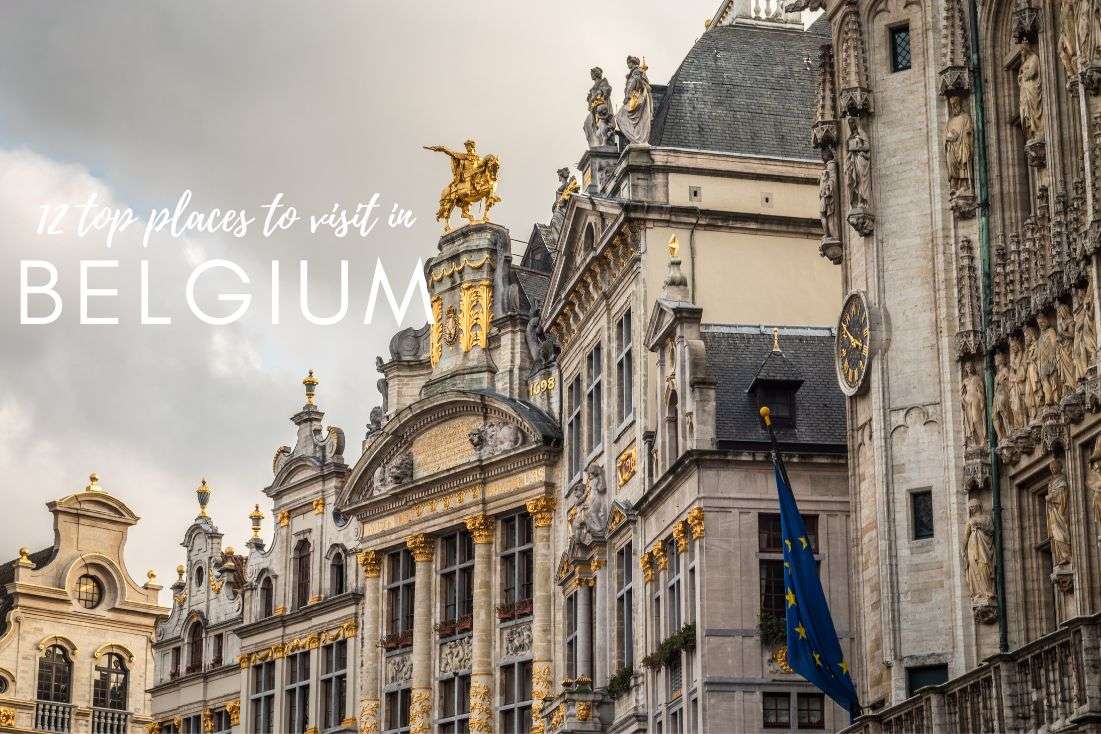
Quick list: The most beautiful places to visit in Belgium
Most beautiful cities in Belgium: Ranked
1. Brussels city center (Grand Place, museums, Cinquantenaire)
2. Ghent—plus Gravensteen Castle
3. Antwerp (diamonds, MAS, Antwerpen-Centraal)
4. Bruges (canals, Belfry, beer)
Belgium towns and villages worth visiting: My top 5
1. Dinant—a Belgian town in a photogenic riverside setting
2. Oud-Rekem—Flemish “most beautiful village” status
3. De Haan—Belle Époque seaside town
4. Deurle—An artists’ village near Ghent
5. Celles—One of the most beautiful villages in Wallonia
1. Meuse Valley—castles, cliffs, and riverside towns
2. Zwin Nature Park—boardwalks, birds, and coastal charm
Unique cultural and museum experiences in Belgium
1. Museums of Brussels—All SO GOOD: chocolate, cars, military, etc.
2. Museums of Charleroi for industrial heritage and standout photography
3. Atomium & Mini-Europe in Brussels—Brussels’ most iconic landmark and its playful neighbor
On my trips, I found the best places to visit in Belgium aren’t just the obvious “most beautiful” towns like Bruges or Ghent, but also the best museums I’ve ever been to, the prettiest city squares that I’ve ever seen, and the most interesting villages, castles, and river valleys that give the country a lot more variety than I first expected.
This list covers the best places in Belgium that I have personally visited. I’ll tell you what I liked and why they are actually worth your time.
Where Belgium really kicks butt is in its beautiful cities like Brussels and Antwerp, but don’t stop there—you have to visit the cute villages and towns in Flanders and Wallonia too. As for nature... don’t expect too much. In Belgium, it’s more or less manmade highlights—the country is flat as a waffle, so there isn’t much going on in terms of scenery (the rare exceptions are in my list).
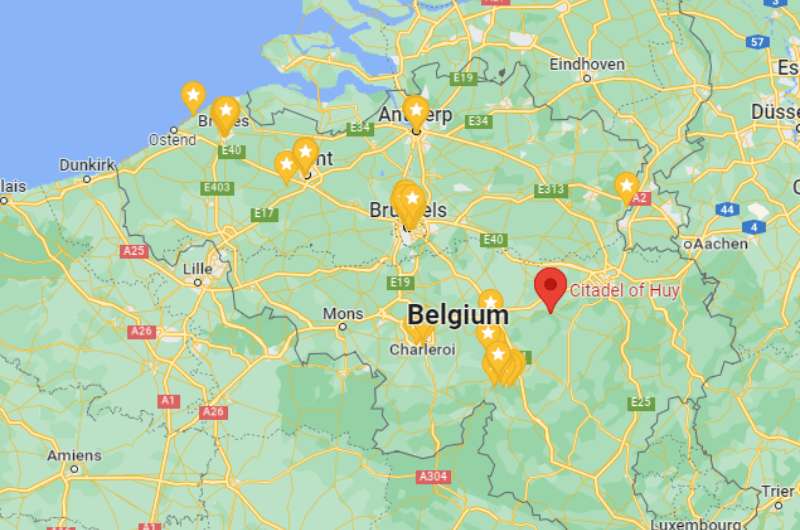
Most of Belgium’s highlights are in the northern half of the country in the region called Flanders
Quick list: The most beautiful places to visit in Belgium
Here’s a quick look at the places covered in this guide to the best places to visit in Belgium based on my own trips:
Most beautiful cities in Belgium:
-
Brussels city center – Grand Place, Royal Quarter, and Cinquantenaire.
-
Ghent – pretty canals, cool vibe, and Gravensteen Castle.
-
Antwerp – diamonds, Rubens, and one of the world’s most beautiful train stations.
-
Bruges – more canals, the famous Belfry, and medieval squares.
Towns and villages in Belgium worth visiting:
-
Dinant – colorful riverside houses under the citadel.
-
Oud-Rekem – voted the most beautiful village in Flanders.
-
De Haan – wonderful villas and wide sandy beaches.
-
Deurle – artists’ village on the Leie.
-
Celles – one of the official Plus Beaux Villages de Wallonie.
Beautiful nature places in Belgium:
-
Meuse Valley – limestone cliffs, castles, and riverside towns.
-
Zwin Nature Park – boardwalks, wetlands, and birdwatching on the Belgian coast.
Unique cultural and museum experiences in Belgium
-
Museums of Brussels – from the Royal Military Museum to Choco Story.
-
Charleroi – industrial heritage and the incredible Photography Museum.
-
Atomium & Mini-Europe – Brussels’ futuristic landmark and its miniature neighbor.
Most beautiful cities in Belgium: Ranked
Sometimes, all you need to do is take the first step... I've filtered out the best hotels in Brussels for you
Save it for yourself to come back to later, or share with your friends on social media!
I've already planned your ititnerary for the trip, complete with my travel tips.
1. Brussels city center (Grand Place, museums, Cinquantenaire)
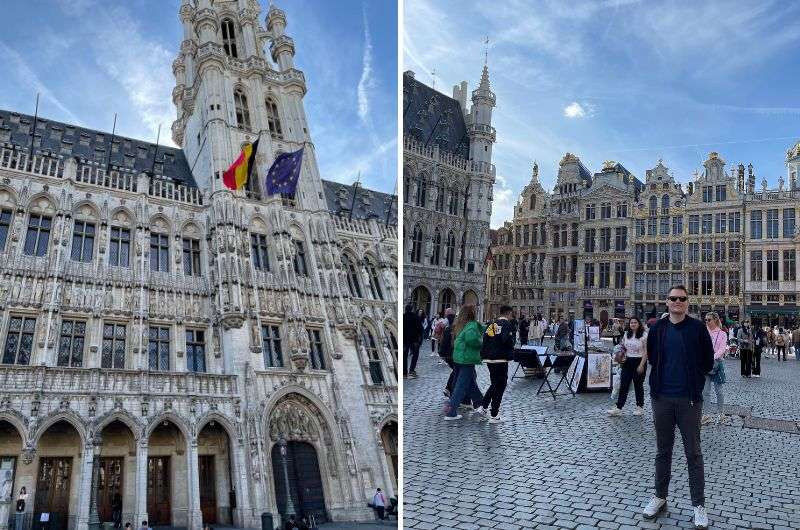
Soaking in the architecture on Grand Place
- Why it’s one of the best places in Belgium: The Grand Place is one of Europe’s most beautiful squares, period.
- Best time: Evening, when the façades are lit up.
- How long: 3 days.
- Personal tip: I went up to the top of the Triumphal Arch in Parc du Cinquantenaire—worth the climb.
- Beauty score: 5/5
My favorite place in Belgium was the I-thought-it-would-be-boring-but-it-so-wasn’t city of Brussels! Yes, it has some very, very good museums and the EU Parliament is sat here, but the best part of Brussels was... Brussels! The city center, to be exact.
What you can see in Brussels historic center

Prime example of Brussels’ intricate designs
The city’s main square, Grand Place, is overwhelmingly elegant. Everything is golden or at least intricately decorated, but most often golden and intricately decorated. It’s just a pleasure to be there, not just because it’s the country’s wealth blatantly on display. For one reason or another, Brussels’ Grand Place is beautiful.
The square is flanked by important buildings. There’s the Town Hall, which was built in the 15th century and is listed as a UNESCO World Heritage Site. It has very detailed Gothic decorations on the façade and a tower that commands attention from near and far.
Or the Brussels City Museum, which is home to the original Manneken Pis statue, one of the more boring icons of Brussels. The museum building itself is at least as interesting as the museum that it contains.
In the summer, you’ll often witness concerts on the Grand Place, and in the winter, things get even more magical with the Christmas market.
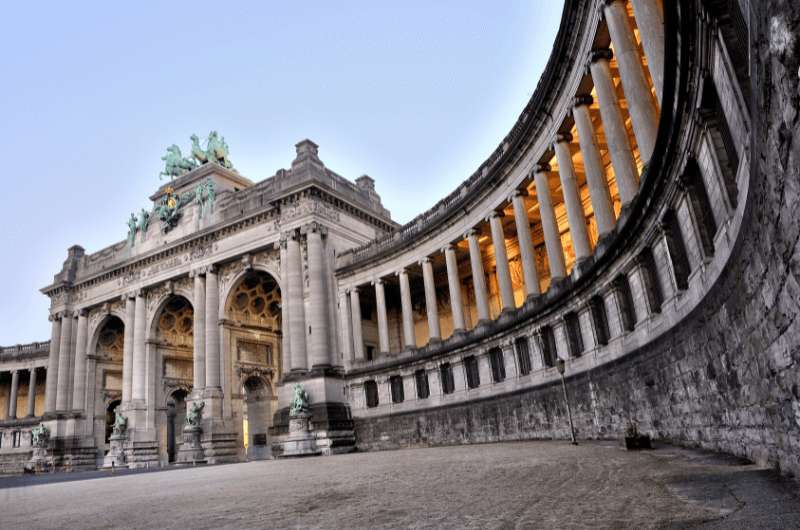
The Triumphal Arch in Brussels, the top of which you can visit when you have a ticket to the Royal Museum of the Armed Forces and Military History. Just wowzers!
Brussels‘ center is wider than just these couple of squares—the Royal Palace and Brussels Park require your visit, especially if you’re there in the short time during the summer each year when it’s open to visitors inside and out.
Keep on heading east from there and you’ll pass the EU Parliament with its Parlamentarium and then Parc du Cinquantenaire, which is full of a number of museums as well as the wonderful Triumphal Arch.
My hotel tip for Brussels: Radisson Red (super cool and comfortable)

2. Ghent—plus Gravensteen Castle
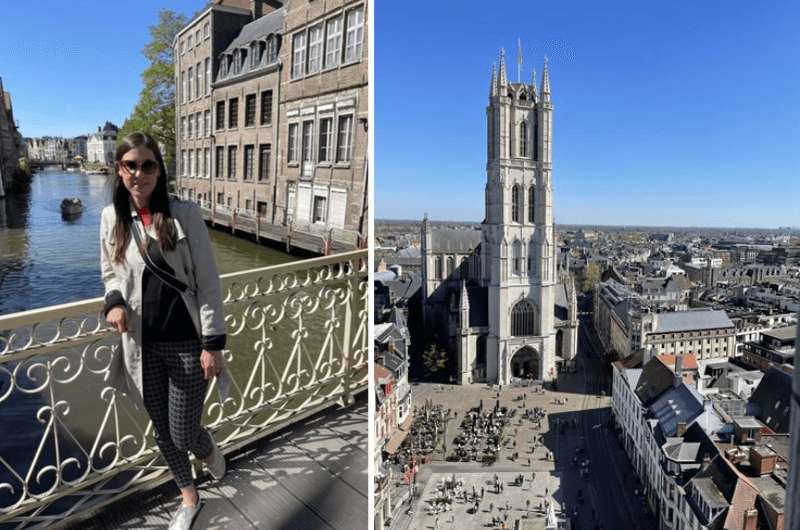
We “ghent” get enough of Ghent!
- Why it’s one of the best places in Belgium: A medieval city that’s lively rather than frozen in time.
- Best time: Late afternoon, weekday.
- How long: 1 full day.
- By train from Brussels: 35 minutes.
- Personal tip: I didn’t book Gravensteen in advance and missed out—don’t make that mistake.
- Beauty score: 4/5
I loved Ghent. It’s not big and you’ll see it all within a day, so it makes a great day trip from Brussels, which is just half an hour away by train.
The 260k+ city of Ghent is more than twice the size of Bruges, but the central area that is of interest to visitors is very small. It does, however, have canals slicing through it, just like Bruges, plus a more youthful vibe. If you look at the places on our list of things to see in Ghent, they’re all located within 1 km2 (0.6 sq. mi). Not sounding so big now, huh?

I’m just going to leave this here and let the Ghent city center speak for itself
What are Ghent’s highlights?
The furthest out you’ll go is the STAM, Ghent city museum. You’ll learn all about Ghent’s history in this super cool museum with multimedia exhibits. Honestly even if you could care less about the city’s history, it’s worth a wander and a look at the modern glass addition to the historic building, plus the cafe serves good food. Win-win.
Tourist life in the city center is centered around Graslei, a sort of promenade by the river lined by gorgeous houses and even more gorgeous eateries. So not a particular thing to see here, but it’s the atmosphere that’ll entice you and make you agree this is one of Belgium’s favorite cities for a reason. It reminded me a little of Copenhagen’s Nyhavn.
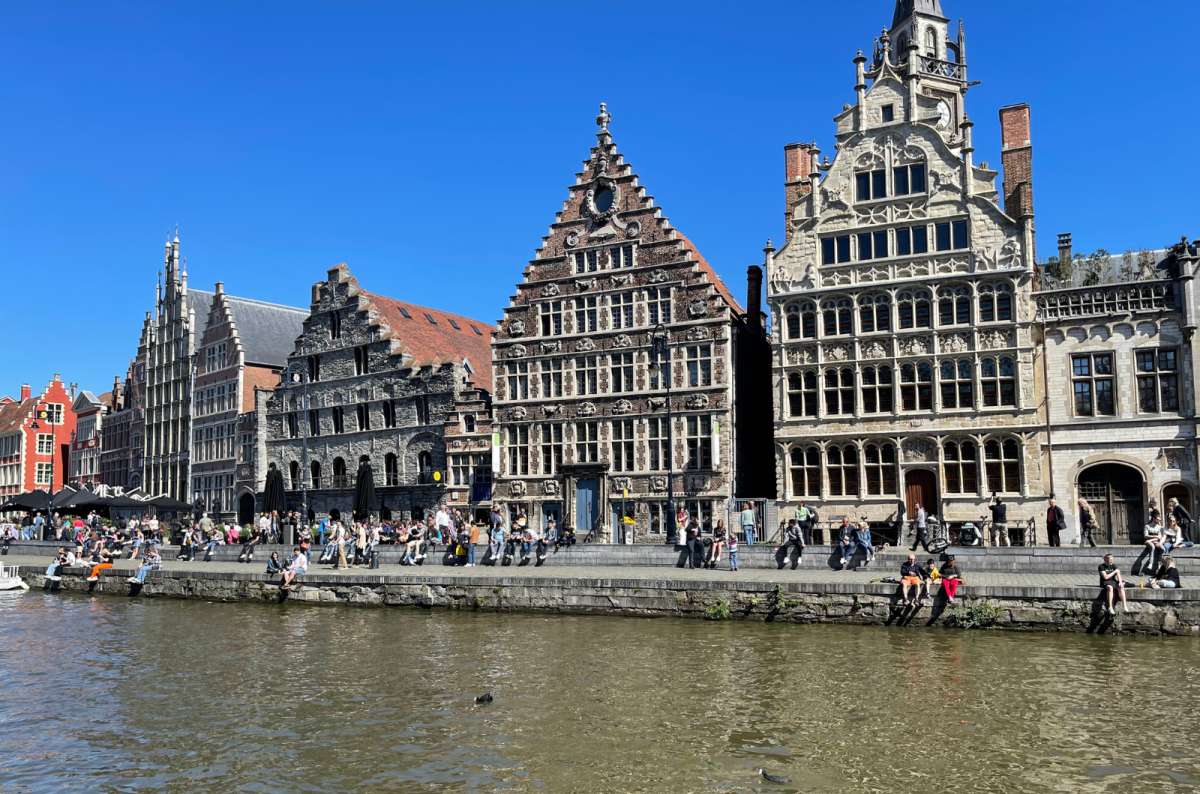
Central Ghent = lots to see
At the southern end of Graslei is the almost mandatory photo op with St. Michael’s Bridge in the background, and from there it’s just a short walk (or scooter ride?) to one of the top sites in Ghent, St. Nicholas‘ Church. Then you can see the Belfry, which actually gives you the best view of St. Nicholas’s Church, and right after that, our personal favorite, St. Bavo’s Cathedral. The interior and art in it are awesome.
Moving to the north, you’ll hit Ghent’s town hall, which is a beautiful, stately building (see it lit up at night if you can) and then, walking through Grafitti Street, you’re almost at one of Ghent’s most prominent plazas, Vrijdagmarkt.
I also enjoyed the Ghent canal boat tour. It’s touristy, sure, but it was also educational and entertaining, and I liked it slightly better than the one in Bruges.
A must-see in Ghent: Gravensteen
My favorite place in Ghent was the 10th century Gravensteen—a fantastic castle surrounded by a moat.

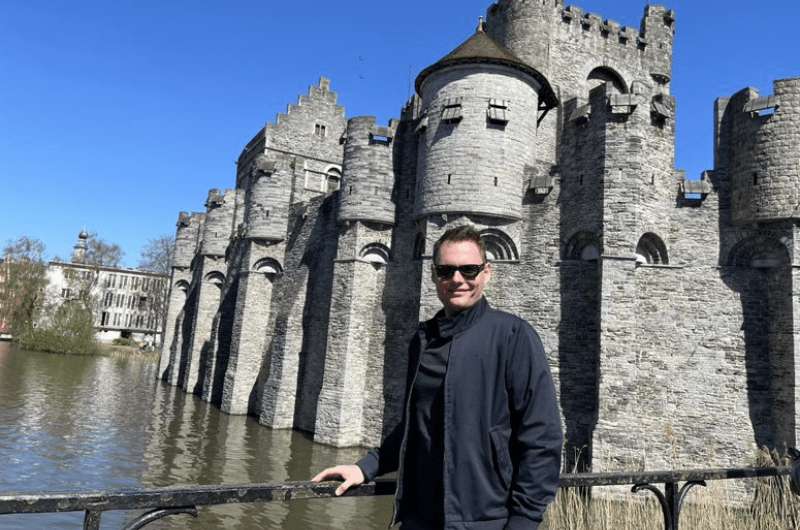
My, my, what a great-looking castle
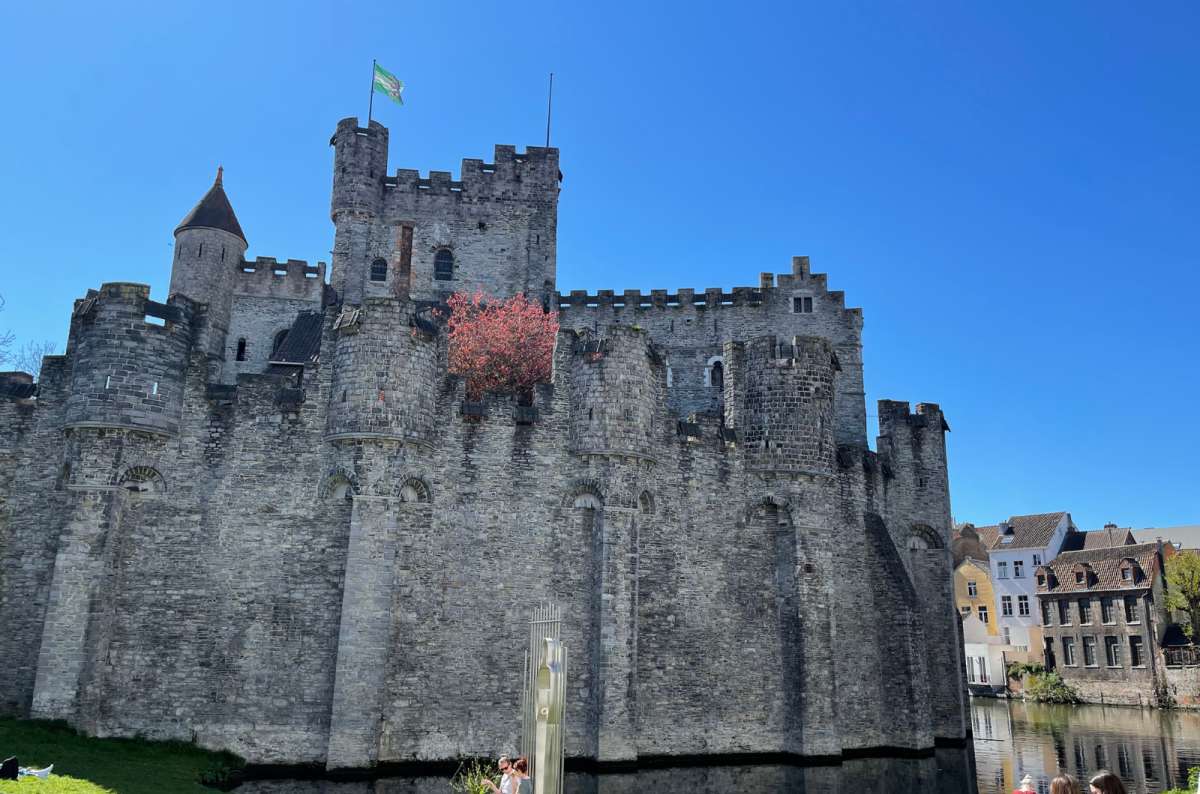
Every history buff’s dream–Gravensteen castle
The “Castle of the Counts” was my favorite place in Ghent. Gravensteen is the only surviving medieval castle in Flanders with a moat and an almost intact defense system. For me as a history geek that was cool to see.
If you buy a ticket in advance and actually get to go inside (unlike me—no tickets in advance meant I couldn’t go in!) you’ll even get to take the supposedly entertaining audio tour, see some torture equipment, and peek at a hidden mural which is only visible from one of the castle’s towers.
My hotel tip for Ghent: Pillows Grand Boutique Hotel Reylof
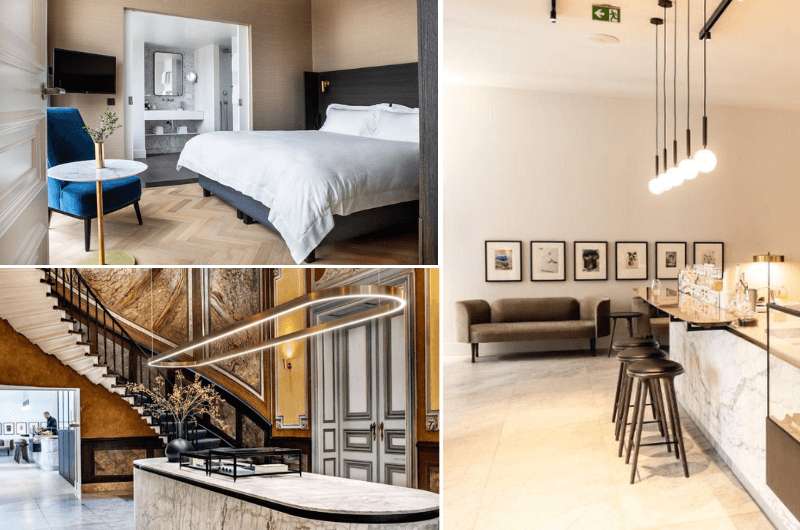
Comfy, cool and chic @ Pillows Grand Boutique Hotel Reylof
3. Antwerp (diamonds, MAS, Antwerpen-Centraal)
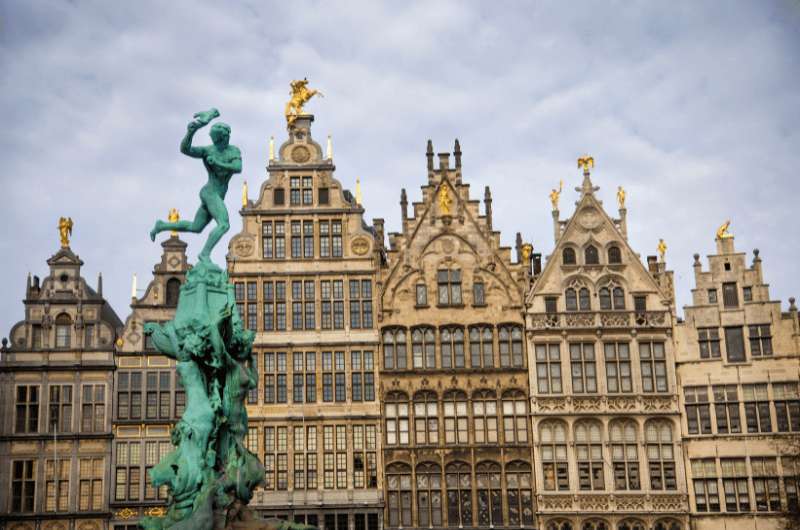
I still haven’t figured out the fountain @ Antwerp Grote Markt
- Why it’s one of the best places in Belgium: A super stylish city with Europe’s best train station.
- Best time: Weekend for nightlife, weekdays for museums.
- How long: 1–2 days.
- By train from Brussels: 40 minutes.
- Personal tip: Antwerpen-Centraal is as stunning as everyone says—stop even if you’re not taking a train.
- Beauty score: 4/5
One of the best places to visit in Belgium is the country’s second largest city and the second largest port in Europe—Antwerp. It is synonymous to diamonds, Rubens, and style.
Antwerp combines the riches of Brussels with the history of Ghent and Bruges, but with a bit of an artsy edge. And nightlife. Like a hipster turned CEO of a madly successful startup. That’s Antwerp.
Understanding Antwerp’s wealth
Antwerp is the world’s diamond trading hub, with 84% of the world’s rough diamonds making their way through. If you are a diamond-loving dude, send your jeweler to Antwerp to get top pick of the uncut rock crop. In 2017, USD 46 billion worth of diamonds was traded in Antwerp. Just think, you could contribute to some of those thousands yourself.
The Diamond district is located close to Antwerp main train station. Plus, the Antwerpen-Centraal station is a sight in itself. Seriously, even if you aren’t traveling by train in Belgium (which you should be!), stop by to look at the magnificent building. It is always on the world’s most beautiful train stations lists.
What all this diamond talk means is that Antwerp is a rich city, which brings all kind of niceness into the historical mix. You’ll notice the old and the new coming together in Antwerp on every corner.
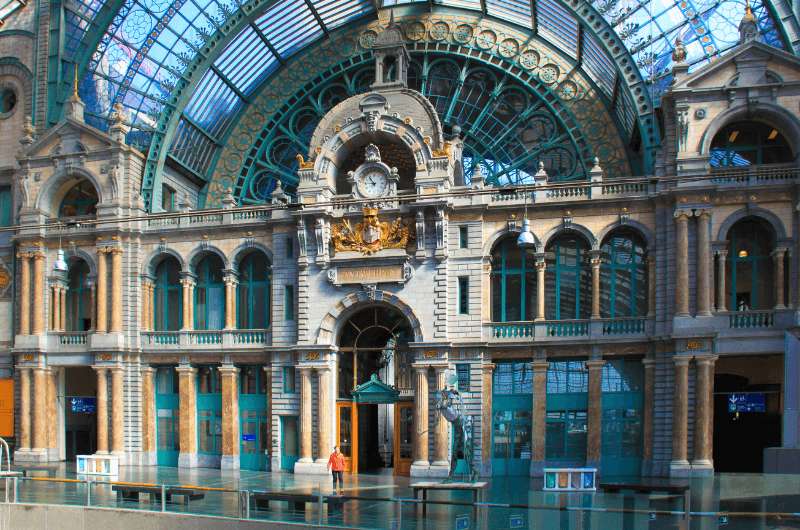
This is what awaits you @ Antwerpen-Centraal train station
What you can see in Antwerp
Take Stadsfeestzaal Shopping Mall, for example. It’s in a restored historical building with arched high ceilings and golden everything.
When you are tired from draining your bank account, you can take a rest at the Champaign Bar. Which probably won’t help with the spending, but it will provide a nice place to recharge. This being Antwerp, it’s not just luxury brand stores, but a nice mix of everything.
The main square of Antwerp, Grote Markt, is surrounded by intricately decorated historical buildings where gold has been used to a great extent, like the City Hall. It isn’t as fabulous as the main square in Brussels, but it’s still nice. And a great place to people-watch and have a beer or three, all while trying to figure out the statue/fountain in the middle.
A few steps off of Grote Markt is the Cathedral of Our Lady, a church with a spectacular white interior and Rubens’ works on display. Peculiarly, there’s also a gift shop and a café inside the church. I mean, why not, grab a beer with Jesus and hash out theories about religion.
Antwerp is also where famed artist Peter Paul Rubens lived and created, and you can see his work all over the city. Or at his house: Rubens House, which he apparently built himself.
The incredibly well-preserved home is a museum where you can see not only Rubens’ paintings and sculptures, but also personal items and furniture from Rubens’ time. There is an interior garden to walk through, too. Just beware it gets crowded on weekends and the audio guide could put you to sleep if you aren’t an art fan.
Antwerp is also home to Europe’s second largest port (after Rotterdam). One visit to the port and you’ll wonder if aliens are taking over. Once you realize it’s just the city’s Port House.
Still want more? See Het Steen Castle, and then compare it to the one in Ghent. Learn about Antwerp’s history in the cool MAS museum. Or about the history of the many immigrants that left Europe to the USA by ship through the very building that the Red Star Line Museum is housed in today.
My hotel tip for Antwerp: Botanic Sanctuary Antwerp (5-star hotel with Michelin-recognized facilities and chefs on site!)
4. Bruges (canals, Belfry, beer)
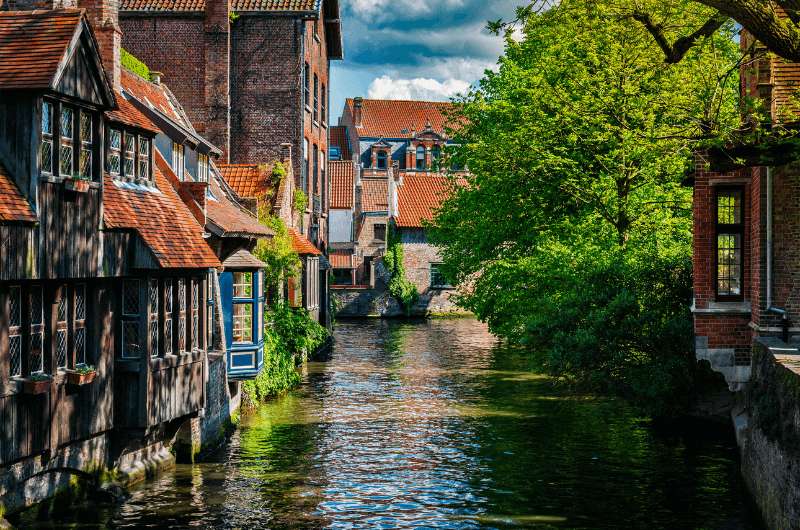
Bruges is undoubtedly charming. But I still liked Ghent a little better.
- Why it’s one of the best places in Belgium: It has one of Europe’s most romantic old towns.
- Best time: Before the tour groups arrive.
- How long: 1 day.
- By train from Brussels: 1 hour.
- Personal tip: Otto Waffle Atelier was the best waffle I had in Belgium.
- Beauty score: 5/5
One of the most beautiful places in Belgium is undoubtedly Bruges (Brugge). I’m going to go against the majority and say that Ghent is better that Bruges,but only by a hair.
Bruges is lovely, thoroughly Instagram-friendly and romantic, but very touristy. So much so that you’ll be hard pressed to find a local, apart from the ones that are serving you lunch in a restaurant or taking you on a canal boat tour. Still, it’s one of the must-visit cities in Belgium.
Focus on places to see in Bruges city center
Bruges city center is basically an island encircled by a river, and then cut further into bits by the numerous canals. So, besides walking, you can also take a half-hour boat canal tour. It’s lovely. But the one in Ghent was better. Again, just slightly.
If you’re visiting with a special someone, you can try to seal the deal at Lovers’ Bridge, or, you can try to find your special someone at Bonifacius Bridge (read all about the love-related bridges in my Bruges guide). And if you want to stay the night, the Relais Bourgondisch Cruyce is considered one of Europe’s most romantic hotels and it’s right on the canals!
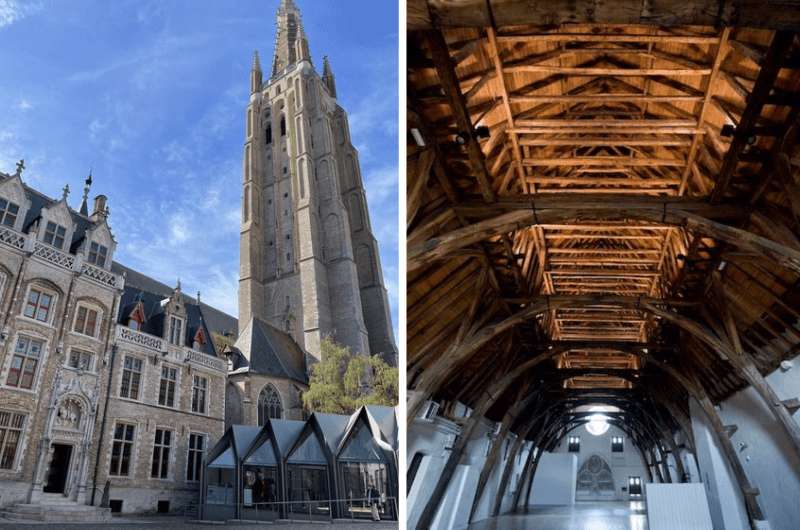
Left: Gruuthusemuseum exterior (that tall tower is not it, it’s the tower of the Church of Our Lady Bruges). Right: the oak ceiling at Sint-Janshospitaal Museum.
You can explore Bruges’ small center, which includes Market Square (Grote Markt) and Burg Square, along with its fantastic buildings—like the Basilica of the Holy Blood with a “real” bit of Jesus’ blood-stained cloth or the Bruges City Hall with its impressive Gothic Hall.
There are several very tall towers that loom over the city, including that of the Church of Our Lady Bruges, which not only has a super tall tower, but it is also home to the only original Michelangelo statue outside of Italy.
The UNESCO-acknowledged Belfry is another. Just make sure you get your tickets in advance or you’ll be stuck looking at it only from the outside, just like poor old ticket-less me.
Beer: Another reason Bruges is a must-see city in Belgium
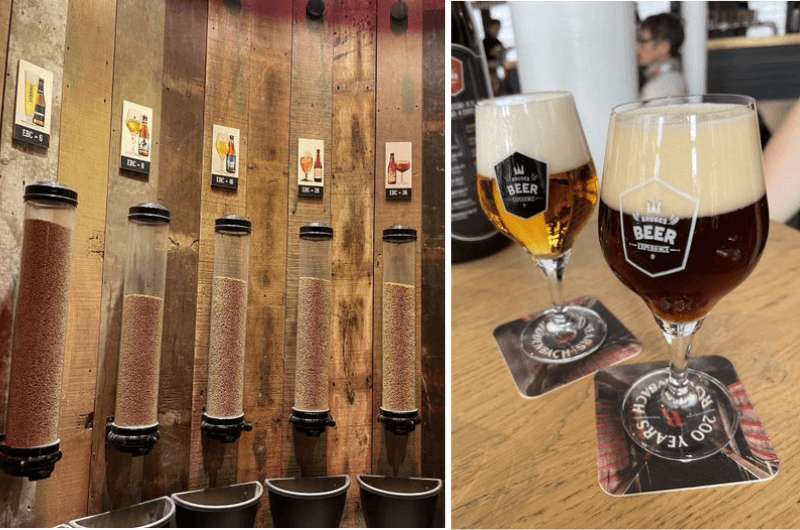
Left: Hops smelling stations. Right: Beer tasting stations @ Bruges Beer Experience
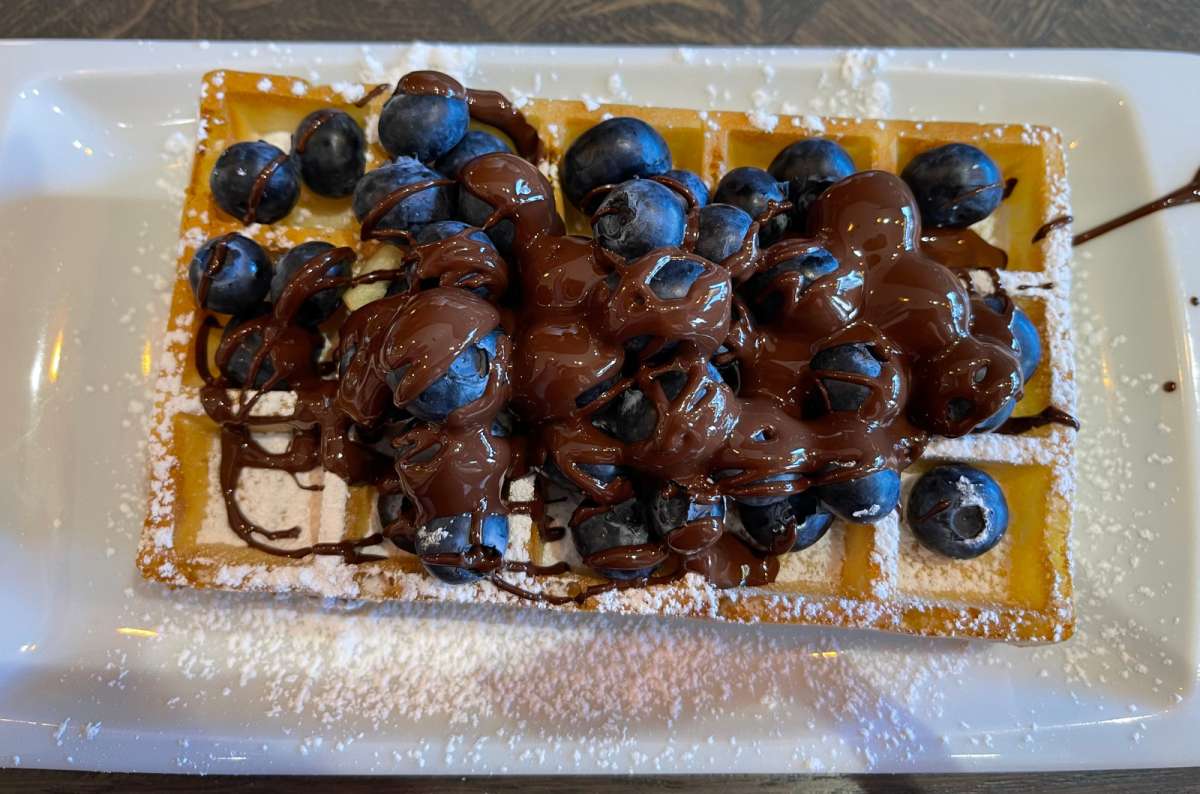
You can't go to Belgium and not have waffles
Bruges is also home to some of the best Belgian waffles we’ve come across, Otto Waffle Atelier. You can read about Otto’s and other great Belgian eateries in our Best Restaurants in Belgium article.
But the two top places that we visited in Bruges were very beer-oriented. The De Halve Maan brewery tour takes you through one of the oldest breweries in Bruges, and the only one that has kept its production within the city center. Check out that underground beer pipeline!
Last but certainly not least is the Bruges Beer Experience. This is such an educational and fascinating museum! Especially for us beer lovers, it was very interesting to learn about the different types of beer. Belgium truly is beer country and the fact that they even pair beers with dishes just like you’d expect to be done with wine says a lot.

My hotel tip for Bruges: Relais Bourgondisch Cruyce (4-star hotel, one of the most romantic hotels in Europe!)
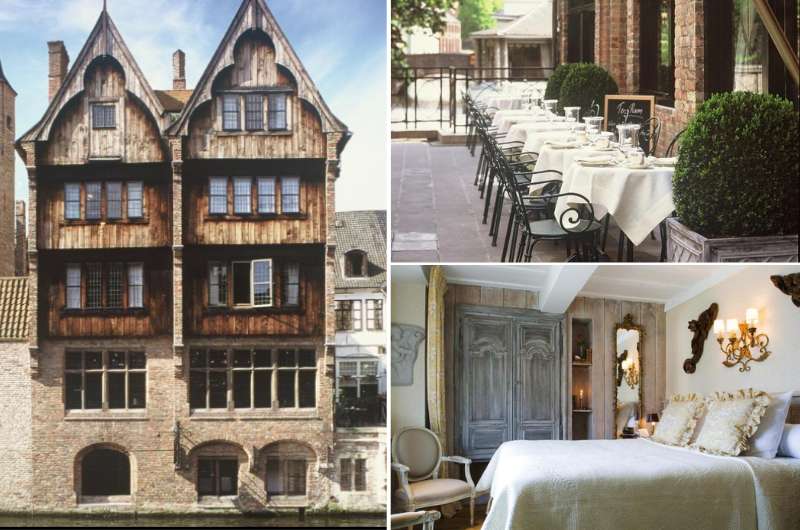
This one sits right on the canals of Bruges @ Relais Bourgondisch Cruyce
Go on the Bruges boat tour
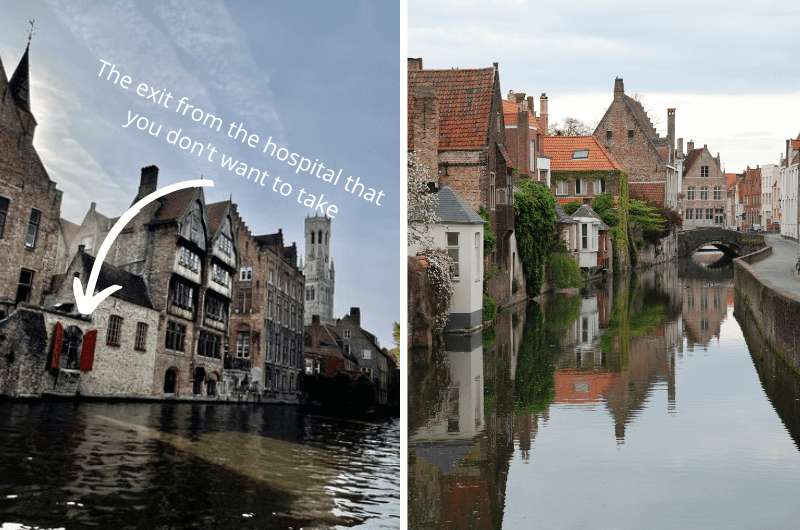
Views during the boat tour in Bruges. To find out who came out the back door and why it was stupid, read our Bruges guide.
What do you get when you add a system of canals to a city full of awesome medieval architecture? Mosquitos! Great Instragram photos! And a lot of bridges, narrow pathways, and just sheer charm.
But most of all, you get to travel around Bruges in a little boat, seeing everything in the city center from a unique perspective (unless you hail from Venice, Italy…in that case, maybe you won’t be that excited about this item). Somehow not needing to walk makes everyone love a good boat ride.
A 40-minute canal tour costs EUR 12.
The guide on the boat tells you interesting bits and bobs about the history of the town and the buildings you are slowly passing by. It’s a pleasant outing that doesn’t hurt your wallet or your legs. Win win.
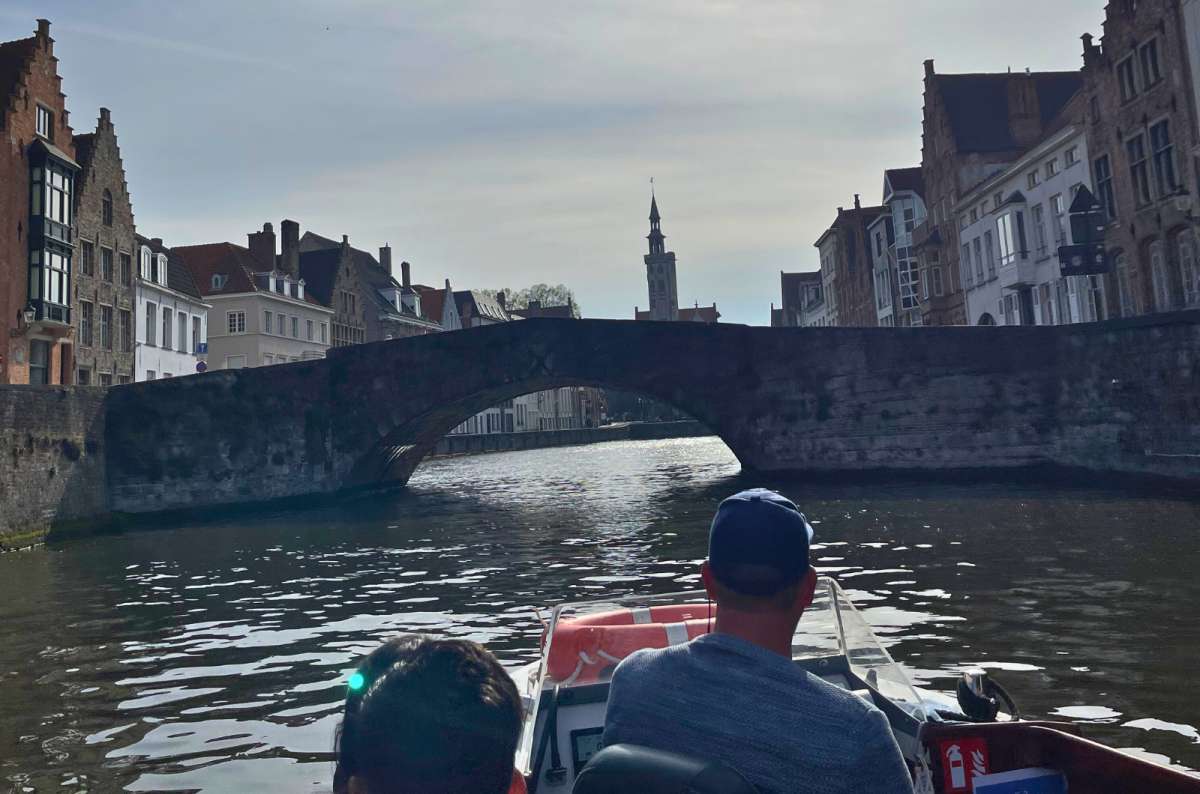
The boat tour presents a nice way to relax while also enjoying your trip and learning about the city of Bruges
Belgium towns and villages worth visiting: My top 5
Flanders, the region where you’ll find the most beautiful villages in Belgium, is the part of the country where they speak Flemish, which is closely related to Dutch, as opposed to the southern region of Wallonia, where French is prevalent.
The region of Flanders used to be (and still is) one of the richest parts of Europe, and because of that, the culture that developed there was sophisticated and well-funded. Many artists have lived here, and that attention to detail shows in its villages. That said, Wallonia isn’t exactly ugly either.
Here are five of my favorite beautiful towns in Belgium (even though Dinant is technically not a village, but the riverside setting and compact center gives it a small-town feel and earns it a spot on this list):
1. Dinant—a Belgian town in a photogenic riverside setting
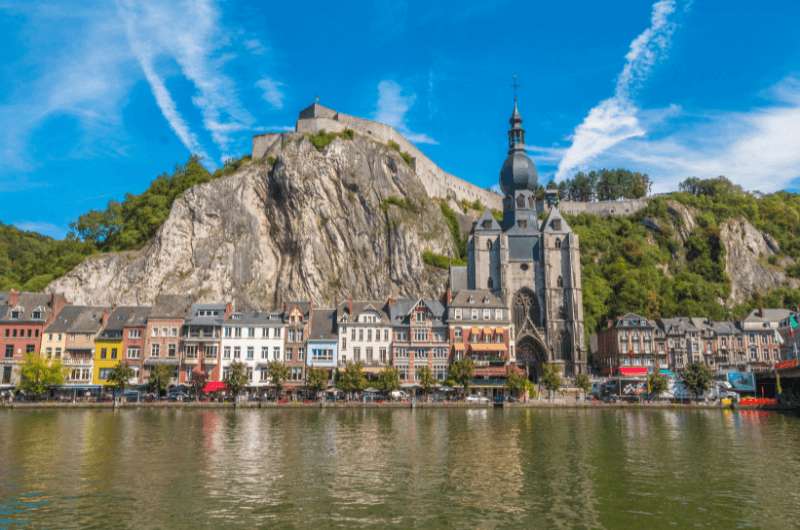
Dinant: Too kitsch or just right?
- Why it’s one of the best places in Belgium: A postcard-perfect riverside setting under cliffs and a citadel.
- Best time: Clear afternoon for views.
- How long: Half day max.
- By train from Brussels: 1.5 hours.
- Personal tip: Take the cable car up to the citadel, but walk down—you get better views that way.
- Beauty score: 4/5
Dinant, the birthplace of the saxophone (you’ll see reminders of the musical instrument everywhere), is the most popular tourist city in southern Belgium. You’ll understand why when you see the row of colorful houses sitting on the Meuse River bank, protected spiritually by the impressive Notre Dame de Dinant and actually by the Dinant Citadel up from the top of the limestone cliffs that form a dramatic backdrop. Just this view alone makes it one of the most beautiful places in Belgium.
I climbed up to the citadel using my own two feet, but you can also take a cable car. It is said that the panoramic views of the valley are cherished more by those that take the stairs! Just kidding, I made that up. But it’s true—been there, cherished that!
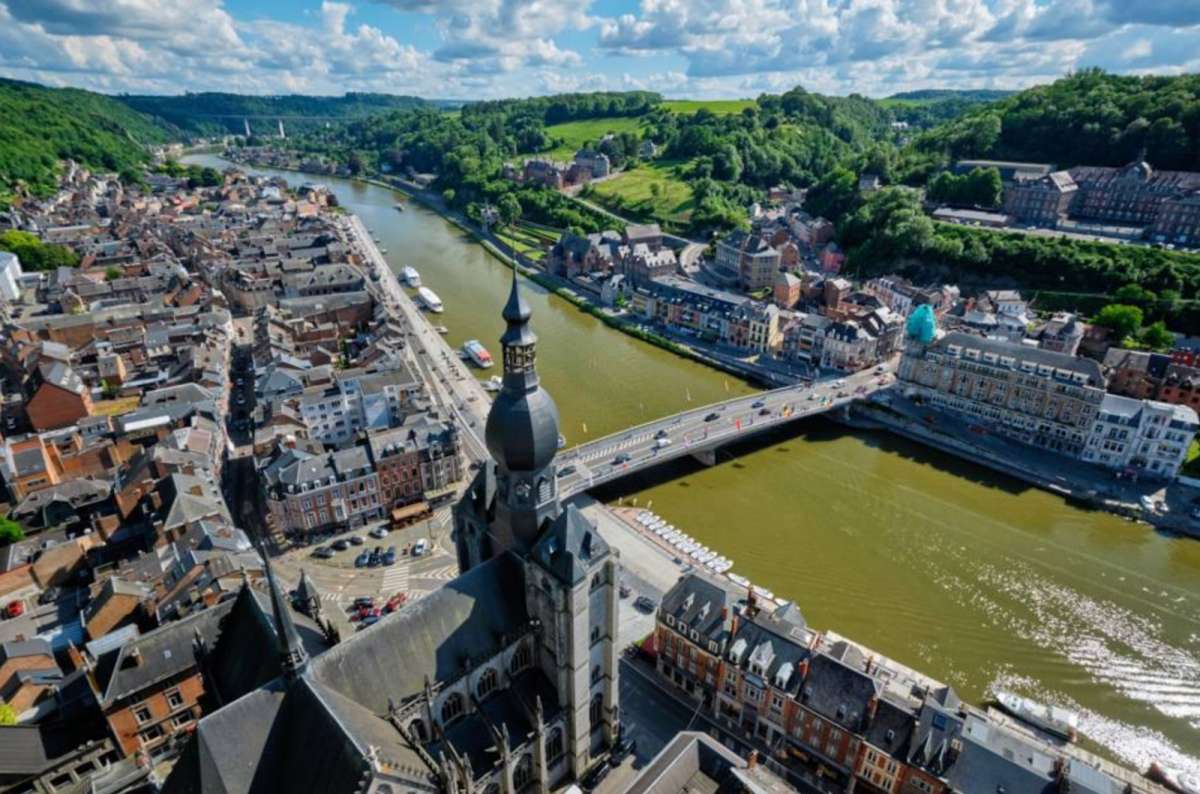
Dinant from up above with a view of the Charles de Gaulle bridge
For the best views of Dinant, walk along the Charles de Gaulle Bridge. Just don’t accidently bump into one of the colorful saxophone sculptures while staring into your phone while taking a photo of the Notre Dame.
As you would expect, the riverside promenade offers a wide selection of restaurants and cafes, but Dinant is the kind of Belgian town where the setting is half the experience.
2. Oud-Rekem—Flemish “most beautiful village” status
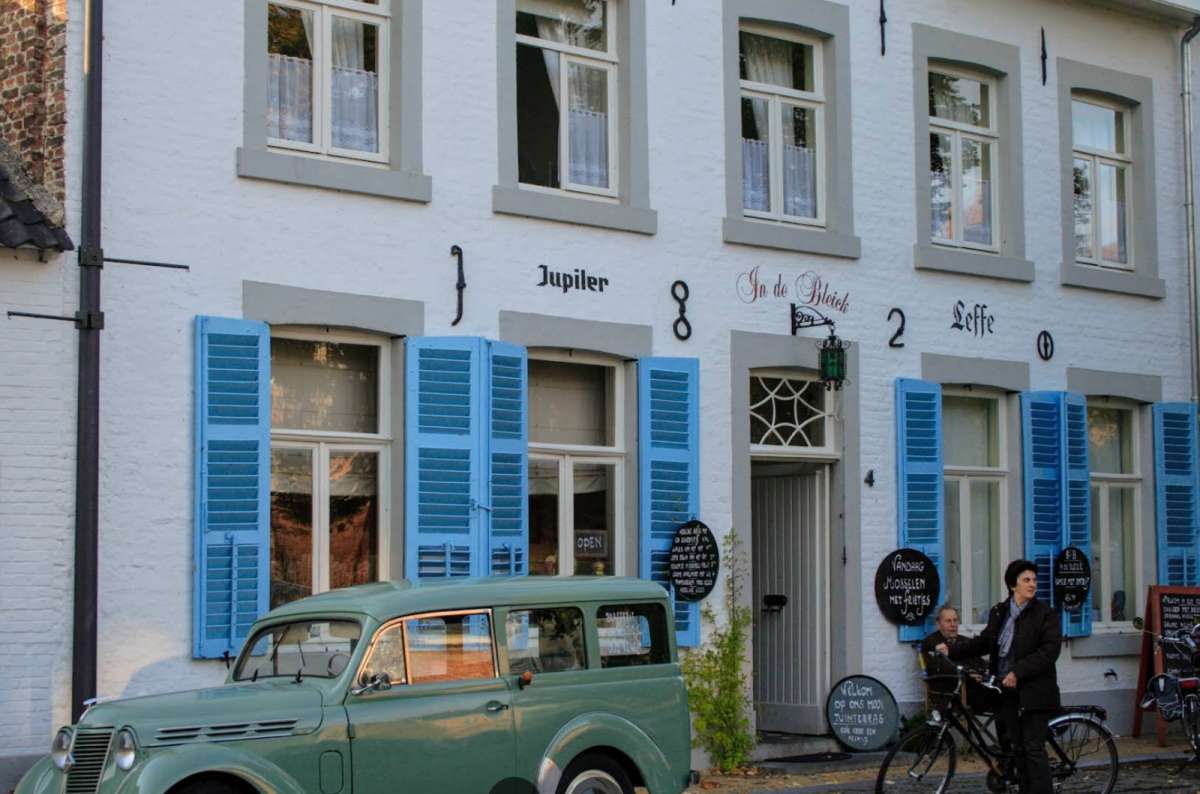
The village of Oud-Rekem is straight up picturesque
- Why it’s one of the best places in Belgium: Officially the most beautiful village in Flanders.
- Best time: Weekend morning when it’s quiet.
- How long: 1–2 hours.
- By train from Brussels: Not practical; drive (1:15).
- Personal tip: The old pharmacy museum was unexpectedly interesting.
- Beauty score: 4/5
Often listed as the most beautiful village in Flanders, Oud-Rekem is compact but worth a slow walk. Or, if you’re me, a fast walk—I had no time to waste on my Belgium trip but still wanted to see what the fuss is about.
Oud-Rekem’s 18th-century center is built around Kasteel d’Aspremont-Lynden, with cobblestone streets, preserved façades, and a calm atmosphere. I liked that nothing here feels over-polished—it’s lived in but still historic. All you need to do is walk and take in the vibe.
A loop through the main square and back lanes only takes an hour, but the detour to the old pharmacy museum adds a little extra depth. And you know me—I love me a museum! Overall, it’s a really nice little village.
3. De Haan—Belle Époque seaside town
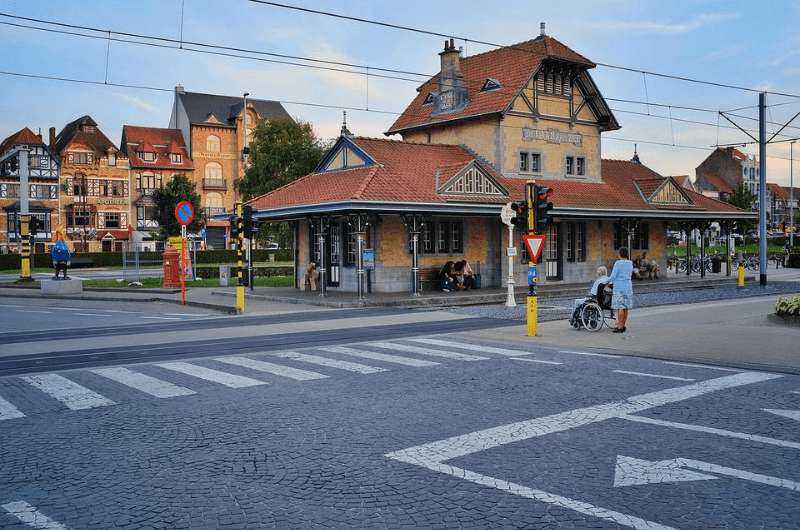
Small town vibes in De Haan
- Why it’s one of the best places in Belgium: A coastal town without ugly high-rises.
- Best time: Summer weekday for fewer crowds.
- How long: Half day.
- By train from Brussels: 1.5 hours (train + coastal tram).
- Personal tip: Cycling through the dunes was far better than walking the promenade.
- Beauty score: 4/5
But if Oud-Rekem, located all the way on the eastern border, is too far out for you, you can instead take a trip to a village that is also Belgium’s best beach resort—De Haan. It’s close to Bruges.
De Haan won the lottery because it never caved to high-rise development. The Concessie district is full of Belle Époque villas, quiet tree-lined streets, and a wide sandy beach framed by dunes. I wouldn’t spend my vacation here, but the town feels like a throwback in a good way. Being coastal and not pretentious earned it its spot on my list of the prettiest villages in Belgium.
I arrived via the coastal tram and spent a couple of hours between the dunes and the promenade, with enough cafés nearby for a late lunch before heading back to Bruges.
4. Deurle—An artists’ village near Ghent
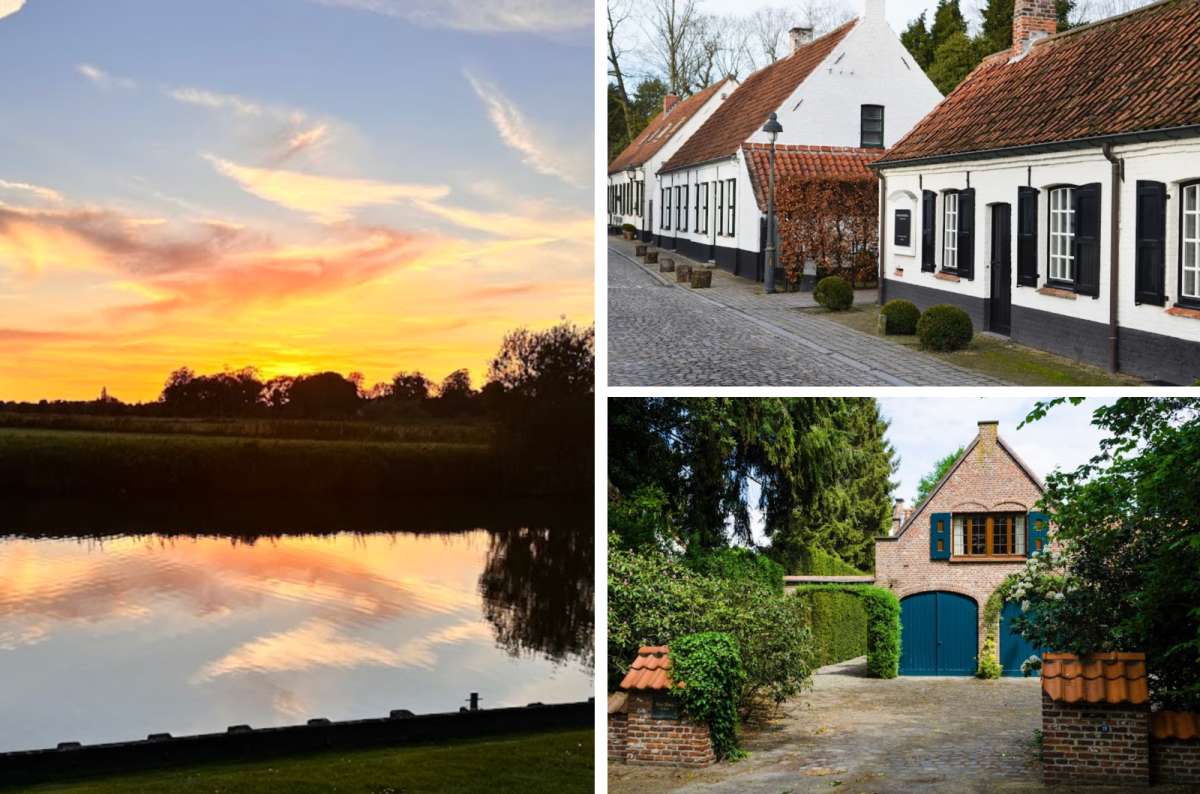
You can’t seriously not notice the picturesque beauty of Deurle
- Why it’s one of the best places in Belgium: A riverside artists’ village with leafy streets and riverside.
- Best time: Late spring or summer afternoon.
- How long: 1–2 hours, or longer with Ooidonk Castle.
- By train from Brussels: 0:50 to Ghent + short drive/bike—better with a car.
- Personal tip: I stopped at Museum Dhondt-Dhaenens—the building’s modern lines stand out against the village houses.
- Beauty score: 3/5
A short trip from Ghent, Deurle is an undeniably beautiful Belgian village. One look at those white or brick houses, all with wooden window shutters, nestled amongst abundant greenery, and you just want to curl up with a book, drink hot cocoa, and never go back to work. I also read about its history that’s tied to the Latem School of artists.
Deurle is peaceful without being deserted—people here still live and work here, which keeps it from feeling like an open-air museum. I made a quick detour here from Ghent (15 km/9 miles), stopped for coffee by the water, and then looped back via nearby Ooidonk Castle, which pairs well with the visit.
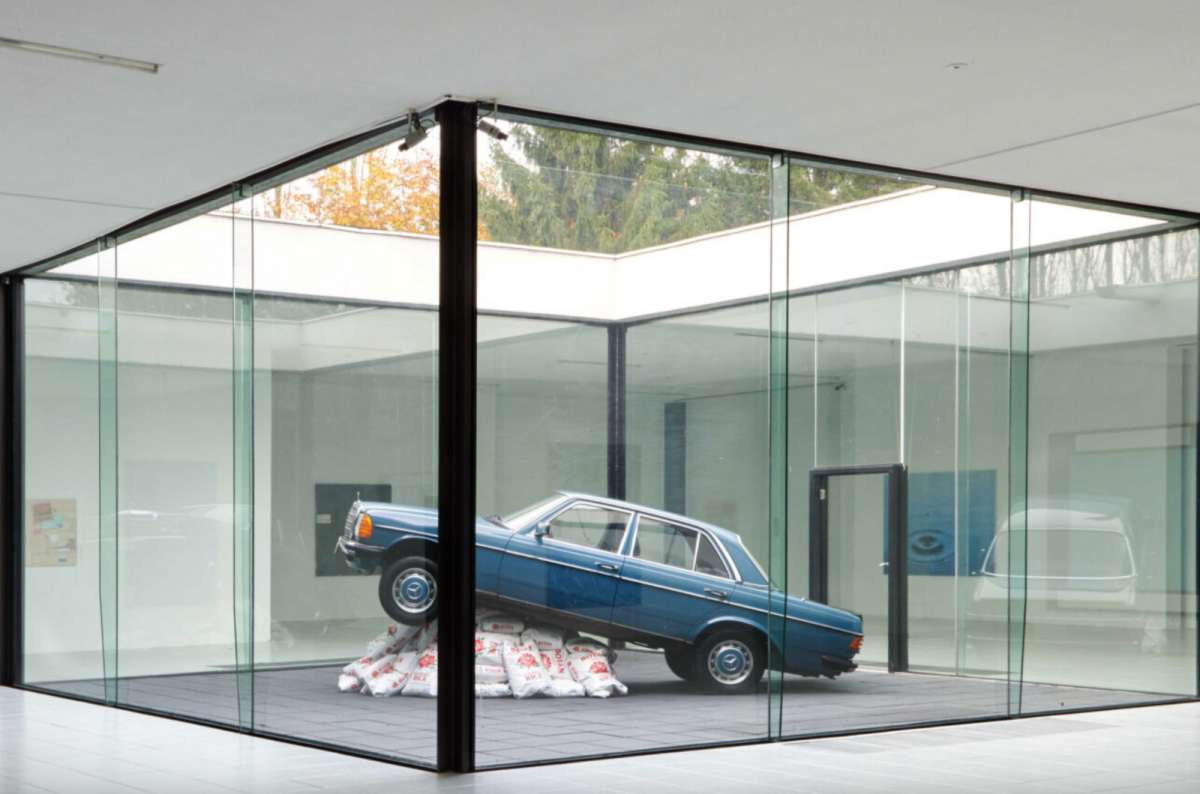
Museum Dhondt-Dhaenens: It really does offer a unique sort of contrast to the typical Belgian architecture
Pro tip: If you have time, check out one of the art galleries or the Museum Dhondt-Dhaenens on the edge of the village. Its modern design is a fun contrast to Deurle’s traditional houses.
Deurle is just 15 km (9 miles) west from central Ghent.
5. Celles—One of the most beautiful villages in Wallonia
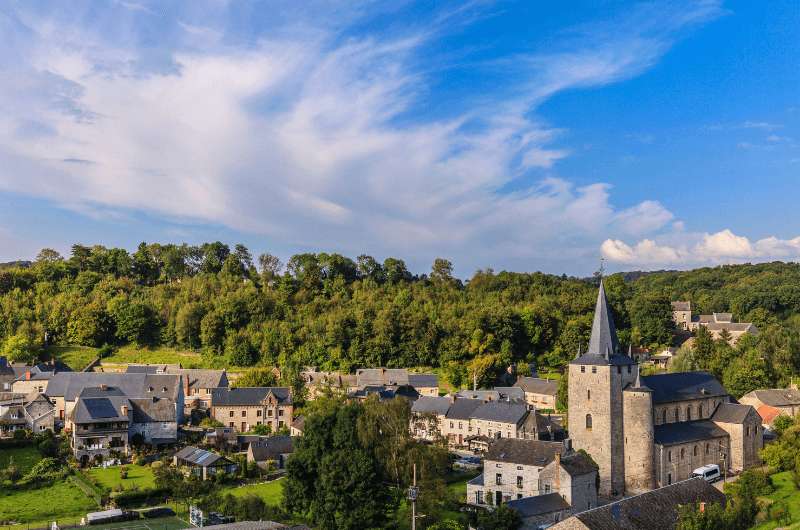
One of Belgium’s cutest villages, Celles, is just a stone’s throw away from Meuse River
- Why it’s one of the best places in Belgium: Officially one of the most beautiful villages in Wallonia.
- Best time: Spring or autumn when it’s quiet.
- How long: 1–2 hours, or half-day with Château de Vêves.
- By train from Brussels: 2 hours with a car transfer from Dinant.
- Personal tip: Climb up to the Église Saint-Hadelin for the best view of the stone rooftops.
- Beauty score: 4/5
Recognized as one of the Plus Beaux Villages de Wallonie (most beautiful villages in Wallonia), Celles is the kind of place that proves rural Belgium can hold its own against the country’s famous cities.
The heart of the village is a tight cluster of stone houses, with the 11th-century Église Saint-Hadelin sitting on a small hill at the center. Climb up for an easy view over the rooftops and the surrounding countryside.I paired my visit with nearby Château de Vêves and the Aiguilles de Chaleux rock formations along the Lesse river. Celles itself won’t take you more than an hour to walk through, but it’s worth slowing down here before heading off to the bigger names in the Meuse Valley (more about it below).
Beautiful nature in Belgium
Belgium isn’t eactly known for its landscapes, but I managed to find a couple of nature places that stand out. The Meuse Valley with its cliffs, castles, and riverside towns, and Zwin Nature Park on the coast. Visit them as a welcome break from all those lovely Belgian towns and cities.

1. Meuse Valley—castles, cliffs, and riverside towns
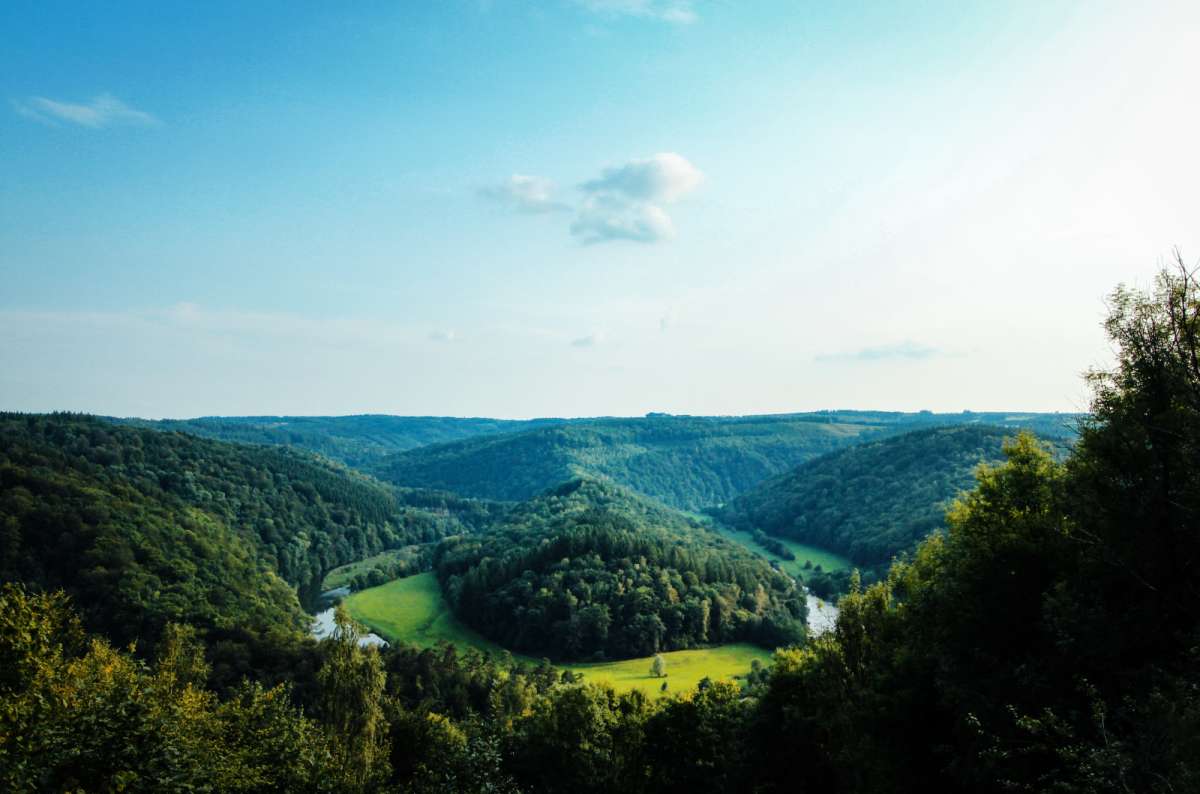
Meuse Valley is where you go to see the most beautiful (and only) nature in Belgium
The Meuse Valley, located in southern Belgium, is probably the most famous natural scenic area. It’s where you’ll find a deep-cut river gorge with limestone cliffs stacked with castles and riverside towns. The Meuse flows in from France, carves its way north, and eventually empties into the North Sea.
This was once an industrial hub, and you still see the ghosts of it—rusting smokestacks and crumbling factories—but if you ignore those, there are stretches of genuine natural beauty. What really makes the Meuse Valley worth a visit, though, are the man-made sights that make good use of the valley scenery: cliff-top citadels, cute villages, and castles on top of the rocks.
Here are the top places to visit in Meuse Valley:
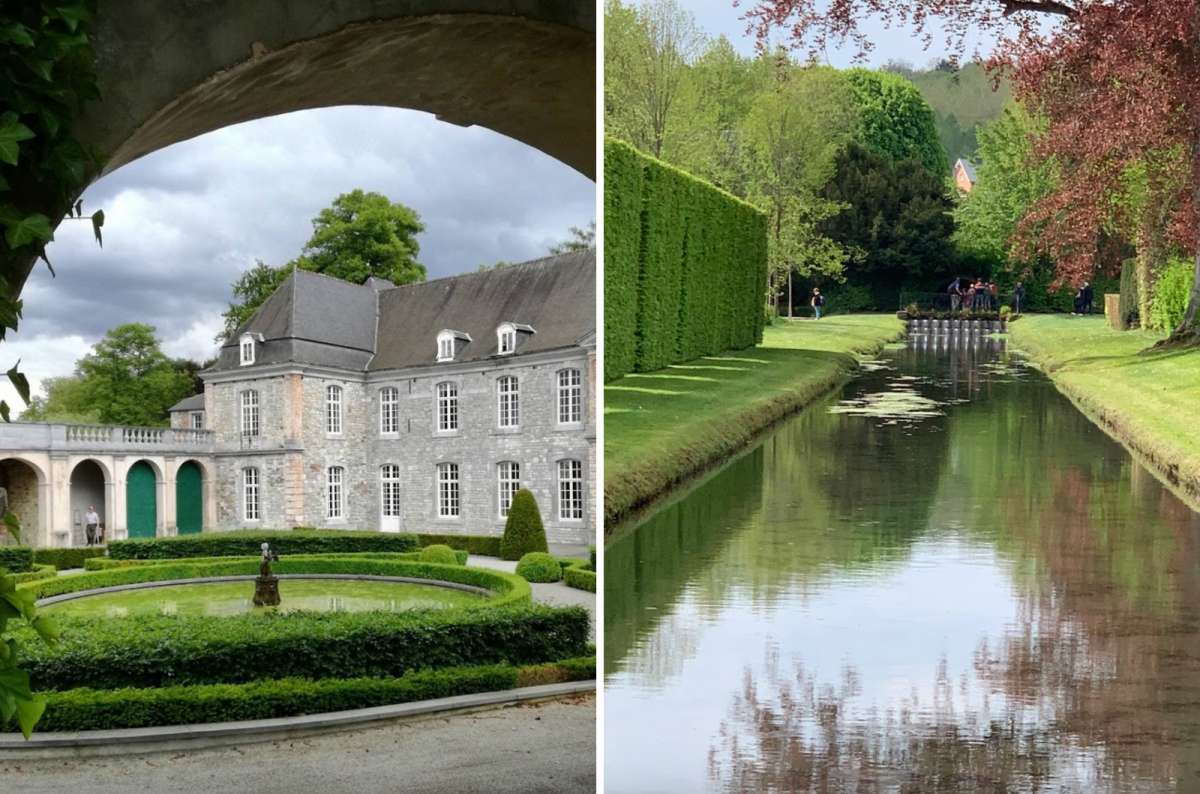
Les Jardins d’Annevoie are breathtaking
- The postcard-perfect town of Dinant, who had its own place further up on this list.
- You can visit the Citadel of Namur, with its underground tunnels, views of Namur and Meuse Valley, and a great museum to boot.
- Stop at Les Jardins d’Annevoie, the 18th century gardens filled with pretty waterfalls and fountains. In Yvoir, you can take a little ferry to an island on the Meuse.
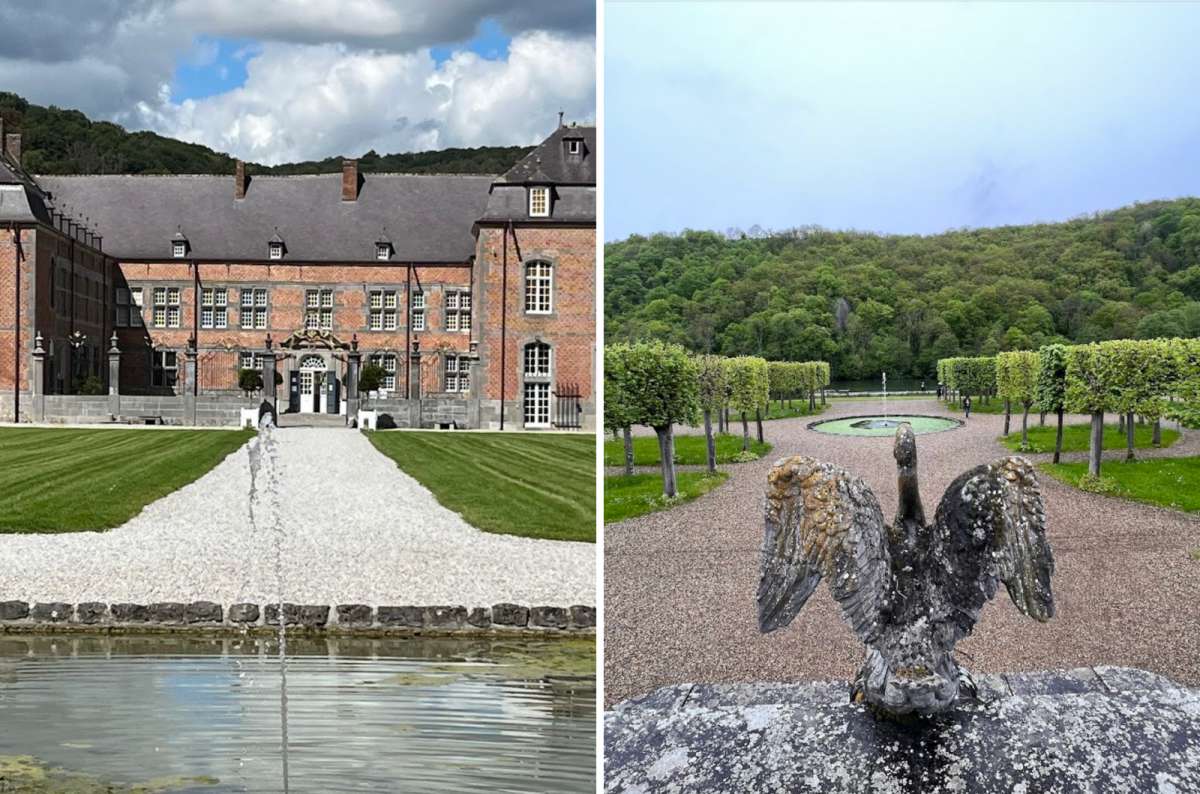
Belgians apparently understood the assignment when it comes to castles
- Explore the Renaissance Castle of Freÿr, which sits right on the Meuse riverbank and has a manicured garden. The best way to see it, though, is probably from the rocks on the opposite side of the river. Any rock climbers out there should take the chance to see the castle from the top of the Rochers de Freyr.
- If you stray from the Meuse and go a bit east, you can wander around one of Belgium’s nicest villages, Celles (mentioned separately in another section above).
- Take a peek at the Disney-esque Vêves Castle stopping to see what some consider Belgium’s most beautiful limestone rock mass—Aiguilles de Chaleux.
2. Zwin Nature Park—boardwalks, birds, and coastal charm
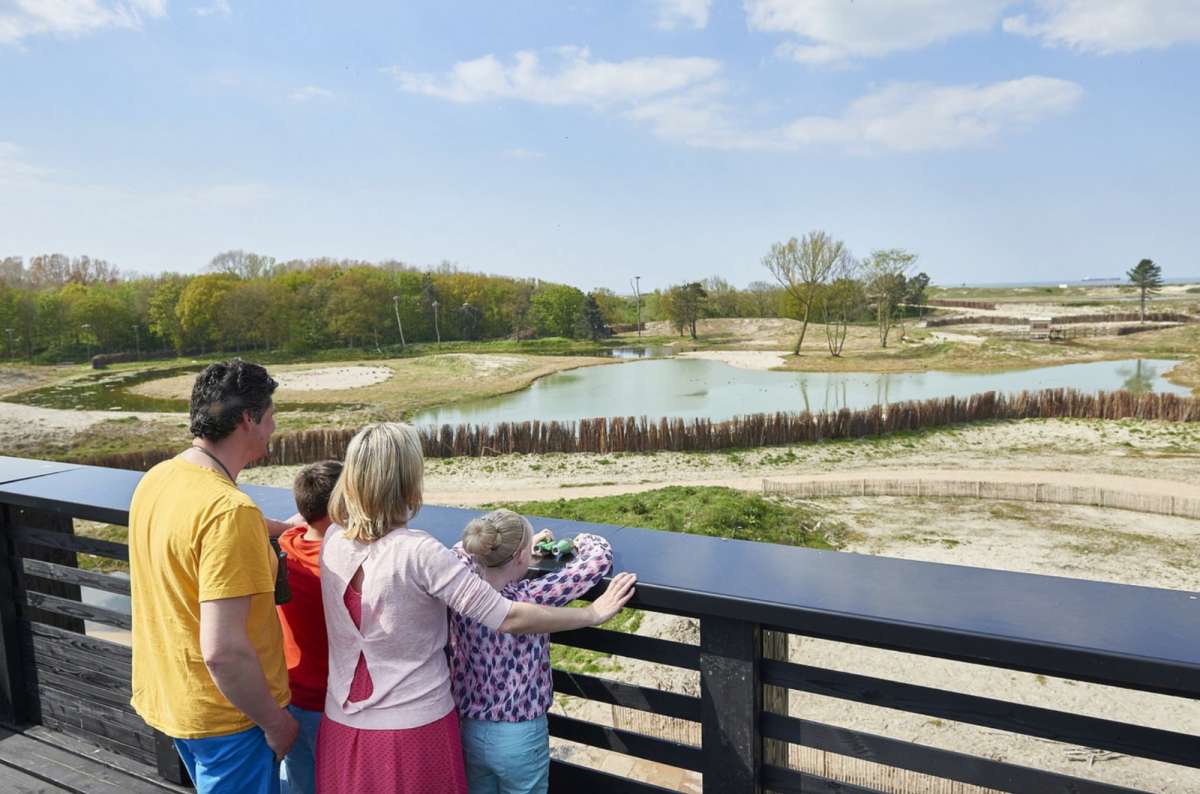
Zwin Nature Park is a nice little getaway when you want to take a little break from the cities
- Why it’s one of the best places in Belgium: Wetlands and boardwalks by the sea with more birds than people.
- Best time: Spring and summer mornings.
- How long: Half day.
- By train from Brussels: 1:30 to Knokke, then bike or walk.
- Personal tip: I rented a bike in Knokke and rode through the dunes to the park.
- Beauty score: 3/5
I count Zwin Nature Park as the easiest escape into real nature from Brussels. It won’t blow your mind, but it’s pleasant.
It’s a coastal reserve near Knokke where short boardwalk trails, bird hides, and an observation tower let you slow down, if that’s what you’re craving on your Belgium itinerary. The walking loop through the nature park is barely an hour if you rush it, but birdwatchers could spend twice that just in the hides—check out the storks, waders, and other flocks of birds I can’t name.
I thought the education center is surprisingly engaging (Belgium does interactive museums well!), and visitor numbers are capped in the summer.
We took the train to Knokke, rented bikes there, and followed the coast and dune paths to the entrance. If you walk, there’s a separate route, so no worries about dodging cyclists.
Unique cultural and museum experiences in Belgium
If you ask me (and you kind of did) the best places to visit in Belgium aren’t scenic villages or natural highlights—they’re Belgium’s galleries, museums, and even futuristic landmarks. These next 3 stops show a side of Belgium that’s as memorable indoors as it is outside:
1. Museums of Brussels—All SO GOOD: chocolate, cars, military, etc.
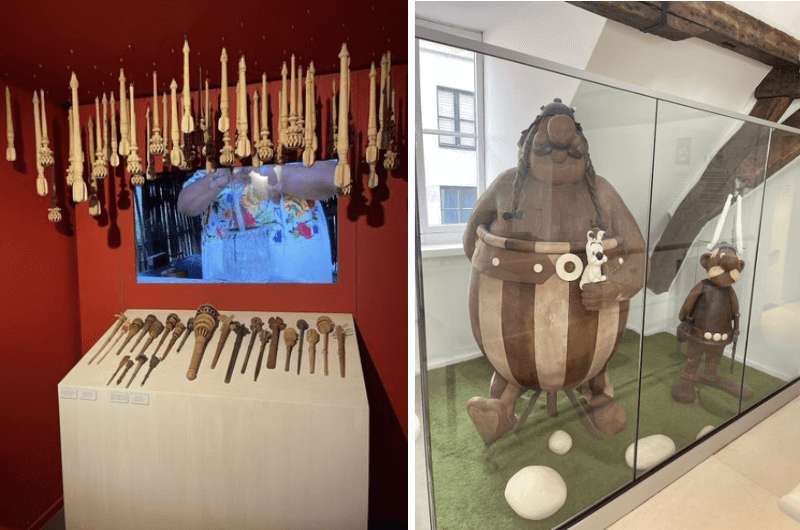
Some of the awesome and probably delicious exhibits at Brussels’ Choco Story Museum
You could spend three full days in Brussels and just go from one museum to the other and still not see the best of them. Heck, just my personal favorite, the Royal Museum of the Armed Forces and Military History, could’ve taken me all day if I wasn’t there with my wife, who was decidedly less enthusiastic about the topic. It. Is. Huge!
What about cars? Do you like cars? I do… so I loved Autoworld. There’s also Train World if you prefer your vehicles on tracks instead of roads.
I mention repeatedly in my comprehensive article about things to do in Brussels, that the museums in Belgium are by far the best I’ve been to anywhere in the world. The standard is just so high, you can see that a lot of care (and money) goes into making the museums entertaining and educational. Everything is interactive, with most places giving you an iPad or similar device that adds another dimension to your museum-hopping experience.
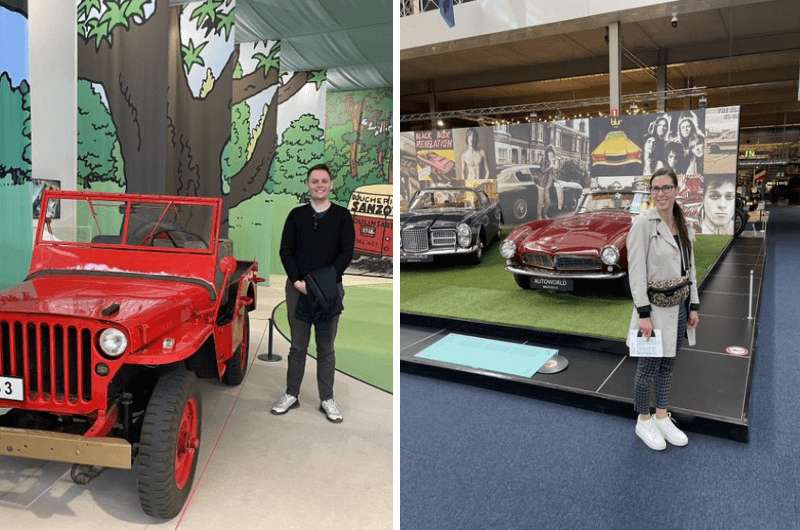
A little bit of car love @ Autoworld
So even a museum dedicated to something as simple as chocolate, Choco Story Museum, turns into a fascinating trip through history and takes you right into the present with a welcome praline tasting. And you can see a huge chocolate statue of Asterix and Obelix, among others. This was the best chocolate museum I’ve been to anywhere, including chocolate’s native Latin America.
Speaking of comics, the The Comics Art Museum teaches you a thing or two about Belgium’s pride and joy. Though not the best museum in Brussels, it just feels like you have to go, or else risk making The Smurfs angry and send Tintin on an investigation as to how someone could miss learning about comics in Belgium.
And how could you visit Brussels, the heart and brain of the EU, and not visit the Parlamentarium—the visitors' center of the European Parliament. It’s free and we loved it.
Pro tip: Many of the Brussels museums I visited made our top museums in Belgium list—check it out.
2. Museums of Charleroi for industrial heritage and standout photography
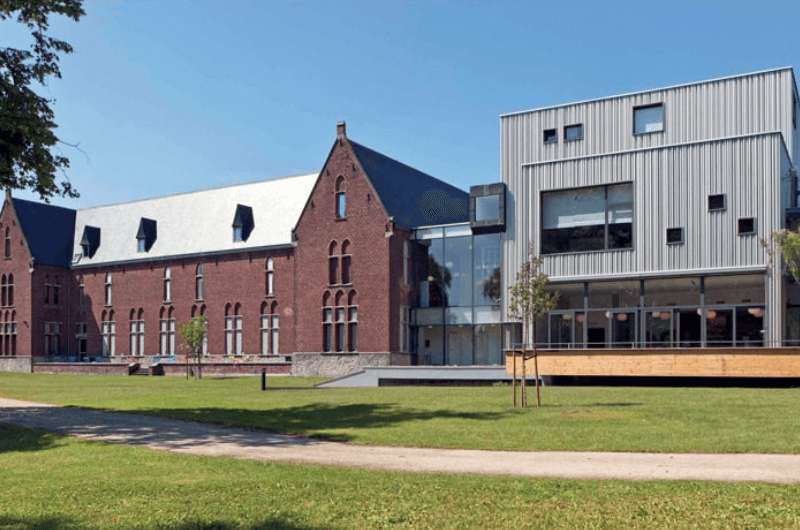
Mixing the old with the new @ Photography Museum, Contemporary Art Center of the French Community
Charleroi is the largest city in Wallonia, the French-speaking half of Belgium. It has a reputation for being ugly, but it makes up for in character and cultural stops. Charleroi wasn’t happy about the unfavorable label it kept getting, so it has seen a major facelift in recent years, making the central part of the city actually pretty nice.
When I visited, I went straight for the museums, and those definitely make it one of the coolest places to visit in Belgium.
My first stop was the Photography Museum, Contemporary Art Center of the French Community. It’s located in a renovated convent building, with a contemporary wing added to the side of it. Even just this contrast of the architecture is worth seeing, though the exhibitions inside (and outside) are a must-see on any art literate tourist’s visit. I’m not a hardcore photography fan, but I still spent a couple hours there.
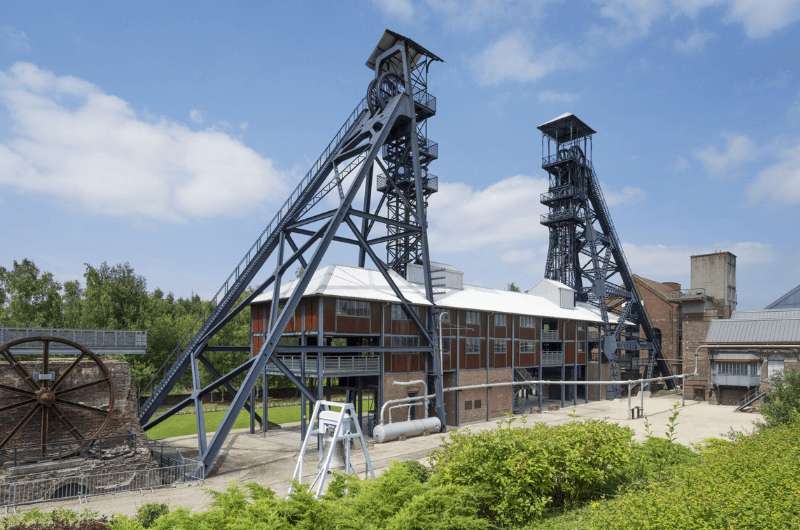
Back to Charleroi’s roots: The former coal mine turned museum @ Boiz du Cazier
I also toured Bois du Cazier, a former coal mine turned industrial heritage site. I took my time in the Industry Museumand the Glass Museum, learning how mining and glassmaking built and later scarred the city. The memorial to the 1956 mining disaster hit hard—it’s impossible to walk away unmoved, even if you have a heart of stone (or glass).
Before leaving, I wandered for a bit through the center spotting comic-themed murals and sculptures—Lucky Luke, The Smurfs, and other Belgian icons. They do a good job brightening up the city. I noticed Charleroi South, the city’s main train station, looking pretty nice on a sunny day.
What else there is to see in Charleroi
If you have extra time in Charleroi, it’s a pretty interesting place to see in Belgium. Across the river from the train station is where you’ll find “new Charleroi“, the facelifted area with shopping malls and welcoming, clean squares. Some are new, and some, like the Le Passage de la Bourse, adds a welcome touch of history (and a place to hide in case it rains).
3. Atomium & Mini-Europe in Brussels—Brussels’ most iconic landmark and its playful neighbor
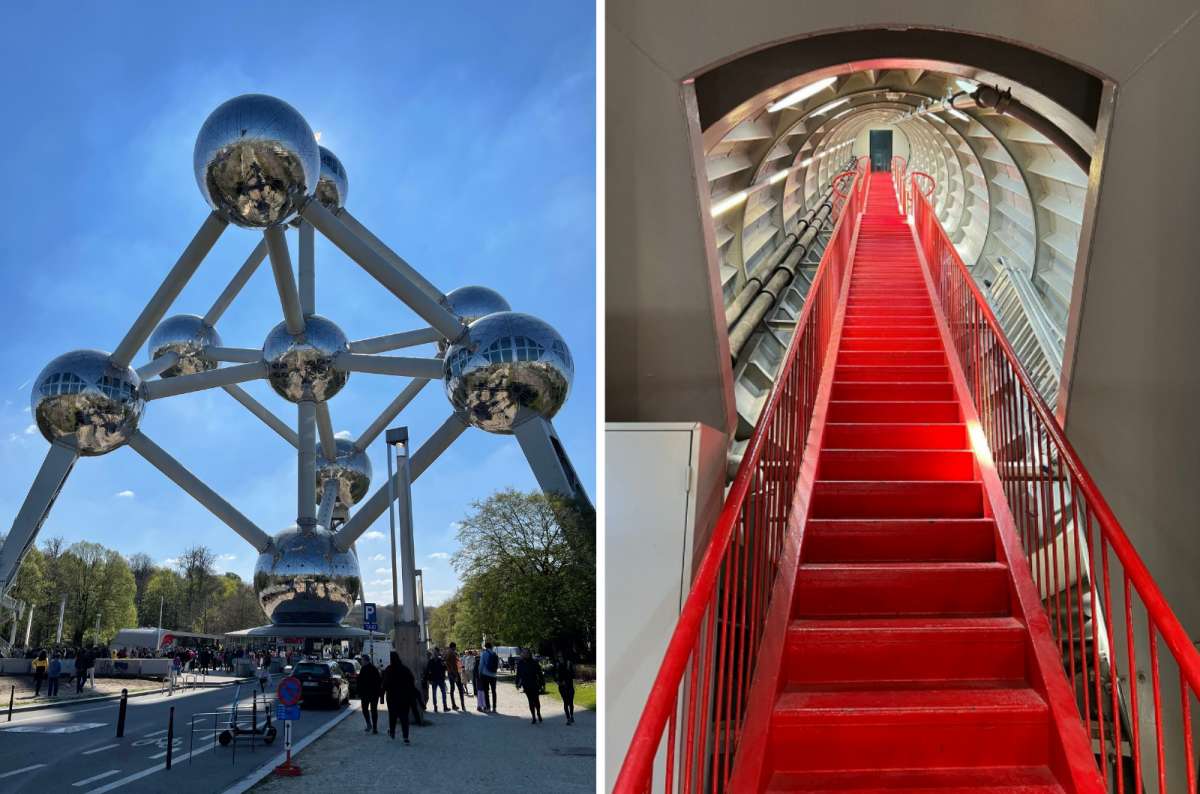
The Atomium was one of our favorite things to see in Brussels
- Why it’s one of the best places in Belgium: It’s Brussels’ most iconic landmark paired with Europe in miniature.
- Best time: Late afternoon for photos with softer light.
- How long: Half day.
- Personal tip: The escalators between the Atomium’s spheres felt like a scene from Star Wars.
- Beauty score: 3.5/5
The Atomium is one of Brussels’ most recognizable landmarks. It was originally constructed as the main—and temporary—pavilion for the 1958 Brussels World's Fair, but is now decidedly permanent. And prominent—the very top orb (one of 9) is 92 m (300 ft) above ground!
For us, just seeing the Atomium from the outside was probably the most interesting part, but you can go inside as well. The concrete base is a museum and you can go to the individual orbs via escalators and an elevator to visit the viewing platform, gift shop, and a restaurant. All while being flashed at with lasers and lights, feeling like you’re in a futuristic spaceship.
See Europe’s top places in one afternoon at Mini Europe!
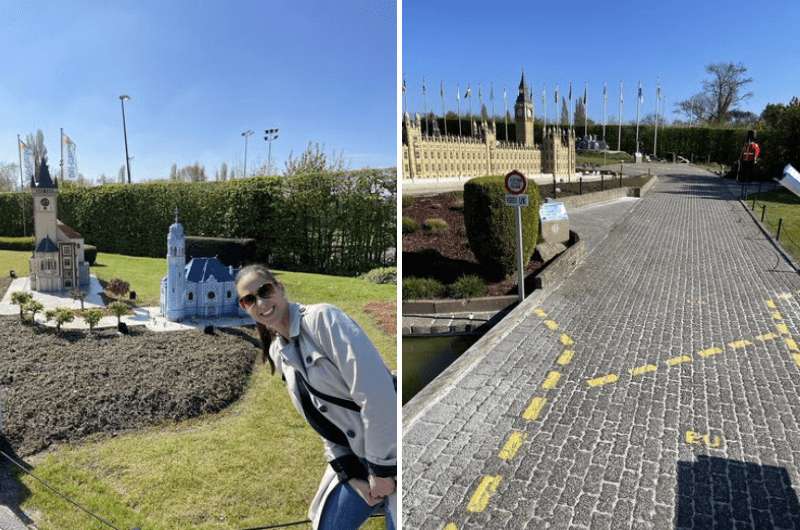
Karin enjoying some tiny castles on the left and London being outed from the EU the right
Right next door is Mini-Europe. I don’t have children, but I’m just a big kid myself, so I expected to love the miniature versions of some of Europe’s most important landmarks. I wasn’t disappointed and spent half a day there and could’ve stayed longer if I had the time on my Brussels itinerary.
It’s kitschy but surprisingly well done, and I ended up spotting details in the models I’d missed at the real sites. The fact that you can photograph an Eiffel Tower replica with the Atomium in the background pretty much sums up the playful mix here.
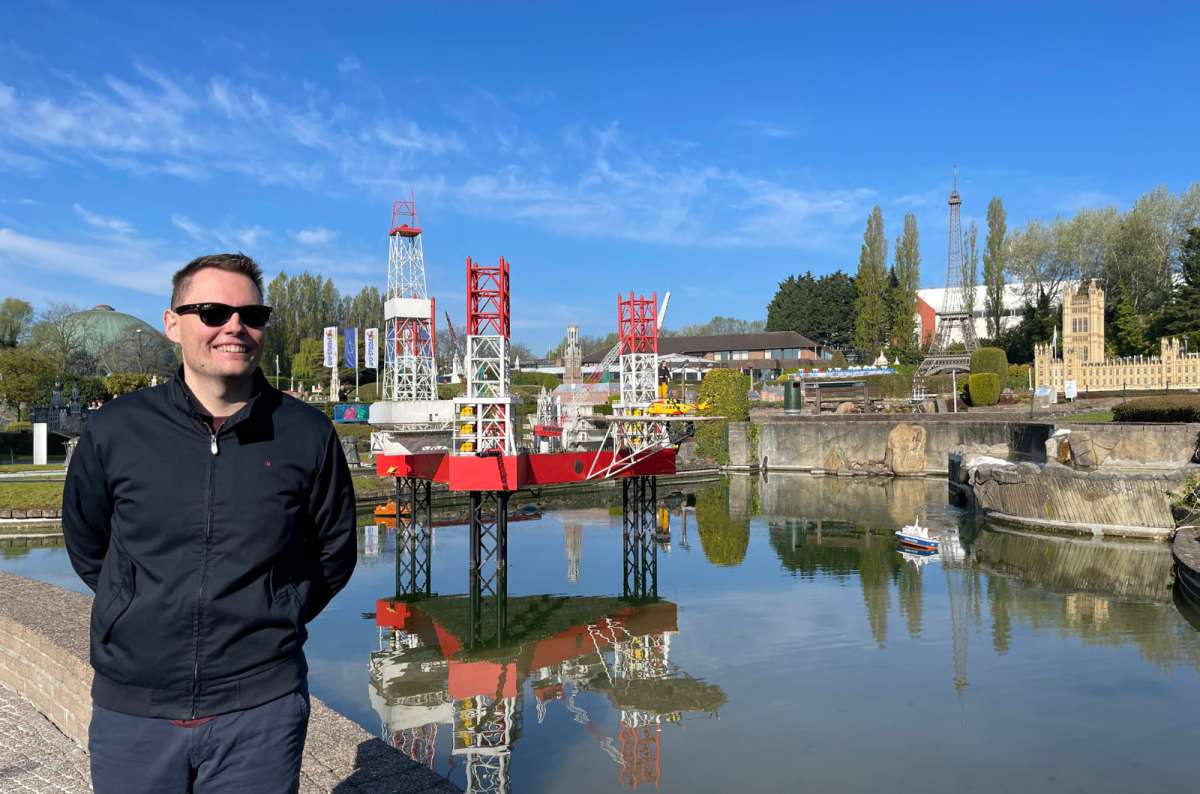
I think you can tell how much I liked it here in Belgium @ Mini-Europe
You might also be interested in reading:
Sometimes, all you need to do is take the first step... I've filtered out the best hotels in Brussels for you
Save it for yourself to come back to later, or share with your friends on social media!
I've already planned your ititnerary for the trip, complete with my travel tips.
This post contains affiliate links. If you make a booking through one of my links, I may earn a small commission—at no additional cost to you. Thank you for your support!
Quick list: The most beautiful places to visit in Belgium
Most beautiful cities in Belgium: Ranked
1. Brussels city center (Grand Place, museums, Cinquantenaire)
2. Ghent—plus Gravensteen Castle
3. Antwerp (diamonds, MAS, Antwerpen-Centraal)
4. Bruges (canals, Belfry, beer)
Belgium towns and villages worth visiting: My top 5
1. Dinant—a Belgian town in a photogenic riverside setting
2. Oud-Rekem—Flemish “most beautiful village” status
3. De Haan—Belle Époque seaside town
4. Deurle—An artists’ village near Ghent
5. Celles—One of the most beautiful villages in Wallonia
1. Meuse Valley—castles, cliffs, and riverside towns
2. Zwin Nature Park—boardwalks, birds, and coastal charm
Unique cultural and museum experiences in Belgium
1. Museums of Brussels—All SO GOOD: chocolate, cars, military, etc.
2. Museums of Charleroi for industrial heritage and standout photography
3. Atomium & Mini-Europe in Brussels—Brussels’ most iconic landmark and its playful neighbor




Comments | Thoughts? Give us a shout!
Recommended articles
Should you visit Bruges or Ghent? I’ve been to both, and there was a clear winner. One is a fairytale packed with tourists, the other a real city that is as lively as it is historic. Here’s how they compare.
Are you ready to spend a lovely week in Belgium? Belgium is home to amazing monuments, the best museums in the world, amazing comfort food, and unexpectedly charming cities. Here's my experience and 7-day plan.
Belgium is known for all the fries, waffles, beer, chocolate, and beer. Here are a few pointers and tips that could be useful for your travel to Belgium. Bits and bobs that you’ll only learn through experience.
About me
Hi, I’m Jan. I travel fast and intensely, whether I’m exploring the buzz of Tokyo in 3 days or road-tripping through mountains and beaches on a 3-week Thailand adventure. And no matter where I am, you’ll always find me in a comfortable hotel at night and eating the best food.
If that sounds like your kind of journey, hop on board, and let’s explore the world together!
I started this blog after realizing how tough it can be to find reliable, authentic travel info. You wouldn’t believe how many “travel bloggers” never even visit the places they write about! On Next Level of Travel, you can count on my full honesty and insights drawn from my firsthand experiences.
More about meHere’s the deal: not every destination is all superlatives and unicorns. I’ll let you know if a tourist attraction isn’t worth your time, like skipping overrated stops in my 2-week Spain itinerary. And when I find something truly special—like the perfect mix of culture and nature in Cape Town—you can trust that it’s worth adding to your itinerary.
Next Level of Travel s.r.o.
ID: CZ07036612
Adress: Voctářova 2449/5, Praha, Czech Republic
Created by myTimi